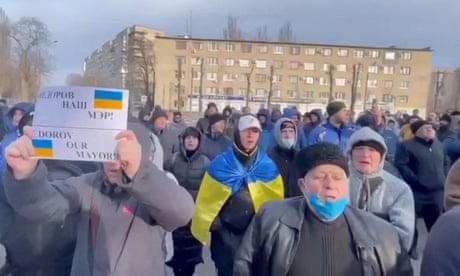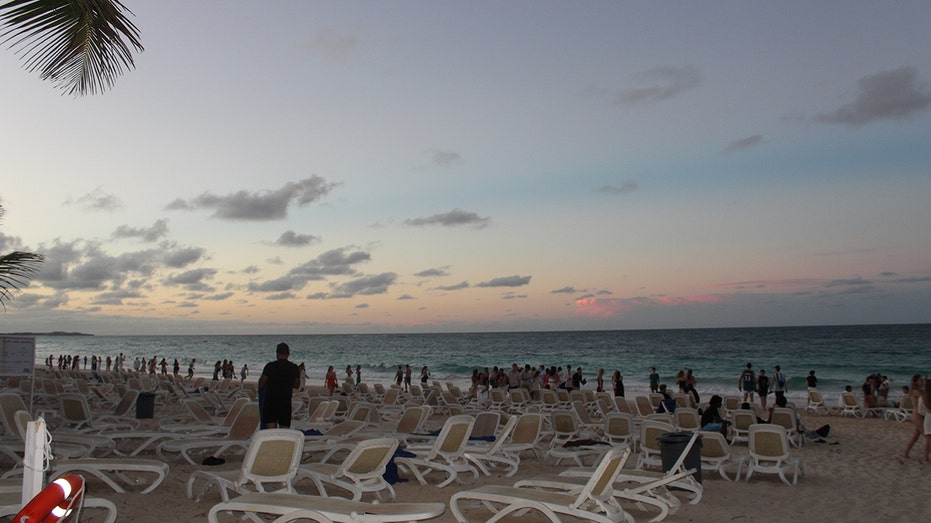- by foxnews
- 12 Mar 2025
‘We’re living a nightmare’: life in Russian-occupied southern Ukraine
‘We’re living a nightmare’: life in Russian-occupied southern Ukraine
- by theguardian
- 15 Mar 2022
- in news

Russian soldiers patrol the streets of Berdyansk in cars and armoured vehicles marked with the "Z" symbol that denotes the Russian occupying force.
Local government officials in this city in southern Ukraine, which has been controlled by Russian troops for the past two weeks, have been kicked out of their offices, and the local radio station plays Soviet ballads and Russian pop songs, interspersed with excerpts from Vladimir Putin's speeches and news items about Ukraine being "liberated from Nazis".
"We feel like we're living a nightmare, and we don't know when this awful dream will end," said one local councillor in the city, who asked to remain anonymous, citing security fears. "We still can't believe that this could have happened."
As international focus remains on Kharkiv, Mariupol and other Ukrainian cities that have come under heavy Russian bombardment, there is a less violent but no less important battle for Ukraine's future going on in a stretch of southern Ukraine that came under Russian control in the first days of the war, without major fighting.
Between Mariupol and Mykolaiv, both of which have come under Russian air attack, there are a number of sizable Ukrainian towns currently under Russian occupation.
In Berdyansk, a port city to the west of Mariupol with a population of a little over 100,000, the majority of city councillors have remained loyal to Ukraine. They continue to run the city, in defiance of the Russian occupation. However, the Russians may be about to transition to more violent methods.
In nearby Melitopol, the similarly defiant mayor was reportedly kidnapped by Russian soldiers on Friday night, marched from his office with a bag over his head, and has not been heard from since.
Soon after, Galina Danilchenko, a local councillor affiliated with a traditionally pro-Russian political party, appeared with a video statement calling on locals not to resist the Russians. "Our main task right now is to adapt to the new reality, so that we can begin to live in a new way," she said.
"They're trying to set up their own authorities in the occupied cities," said Olena Zhuk, chair of the council for Zaporizhzhia region, which contains both Melitopol and Berdyansk.
"They are trying to buy people out or find supporters in the current authorities, and the mayor of Melitopol, who refused to cooperate, was kidnapped. It's absolutely unheard-of behaviour," she said.
A Telegram channel set up by authorities in Berdyansk to communicate with locals gives a remarkable insight into how the Russian occupation unfolded on the ground.
On 26 February, two days after the Russian assault on Ukraine began, the acting mayor, Alexander Svidlo, made his first video address on the channel. Sitting at a desk, a houseplant behind him, Svidlo noted that "a column of Russian hardware is moving" in the direction of the town, and asked residents to stay calm.
The next day, residents were ordered to switch geolocation off on their mobile phones and remove any suspicious markings on trees or buildings that could be artillery target markers.
On the evening of 27 February, Svidlo appeared again, this time in a dark room, looking exhausted and shaken.
"A few hours ago, we all became witnesses of how heavy military hardware arrived on to the territory of our city," he said. He explained that Russian soldiers had entered the city administration building.
"We were offered to continue our work but under the control of those people. I believe this to be unacceptable, and so we all left the building and are continuing to work from a distance," he said. "I don't know what will happen tomorrow."
Svidlo and a majority of the city councillors moved from the building to continue their work elsewhere, in defiance of the Russians. At a council meeting held on 3 March, 28 of 38 councillors were present, according to one source who attended.
It seems the Russian army expected large segments of the population in places such as Berdyansk and Melitopol to welcome the Russian army as liberators, as happened in 2014 in Crimea.
"For years they have been lying to themselves that people in Ukraine were supposedly waiting for Russia to come," said the president, Volodymyr Zelenskiy, in a video address released over the weekend. "They did not find collaborators who would hand over the city and the power to the invaders."
Many older residents of the region felt disfranchised in modern Ukraine, but these views have been changing gradually over the past decade, and then rapidly during the last two weeks of the Russian attack on Ukraine.
"Of course, there are some fans of the 'Russian world' among the population, but every day they are fewer and fewer. People can see that the 'Russian world' is not what Russian propaganda promises. It's poverty, violence and destruction," said Anna Ukrainska, a schoolteacher in Berdyansk.
In Berdyansk, as in many occupied cities, protests have drawn hundreds if not thousands of unarmed Ukrainians to the streets, often furiously shouting abuse at the Russian soldiers, who appear uncertain how to react.
In the town of Nova Kakhovka, Russian authorities threatened to cut off water and electricity if another protest was staged, according to one resident who attended a protest a week ago. Nevertheless, on Sunday a second protest took place in the town, as well as in numerous other cities.
A counter-protest on the same day was organised by the Russians, said Lera, using people she believed were not local, and was filmed to create images suggesting Kherson was welcoming Russian troops.
Rumours have been spreading that the Russian occupying authorities are planning to stage a referendum in Kherson, similar to those held in Crimea and the Donbas in 2014 that provided a veneer of legitimacy for Russian actions.
Russian soldiers have set up checkpoints throughout the city, and Lera said two friends had told her that in the past few days the soldiers had started demanding to inspect the phones of those passing through.
In Berdyansk, Russians have also set up checkpoints on the outskirts of the city, preventing people from leaving. In any case, doing so would require a dangerous drive across the frontlines.
Supermarket shelves in the city are empty and there is a dangerous shortage of medicines. On Sunday evening, Svidlo posted that two city workers had managed to drive a van of medicines safely into the city, which would help save lives.
The mayor's office is putting together a list of people who want to leave in the event that a humanitarian corridor can be agreed with the Russians, but so far there has been no agreement.
Each evening, residents listen to the voice of the Russians on the radio, who address the locals with promises of a happy new life and threaten criminal cases against Ukrainian officials. Many, however, remain sceptical of the promises.
"On the radio, they address people as 'comrades'. They still live in the Soviet Union and they want to build it here. We have already moved ahead of them by several decades, we don't need that," said the local councillor.
- by foxnews
- descember 09, 2016
Daring airport trend has travelers arriving at gate 15 minutes before takeoff
Flight passengers are participating in the new viral trend, "airport theory," with flyers arriving at their gates 15 minutes before their flights depart. A travel expert weighs in.
read more


